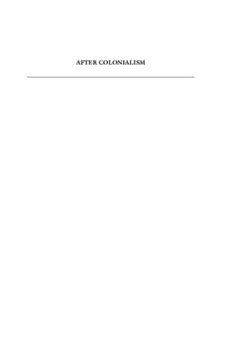
After Colonialism: Imperial Histories and Postcolonial Displacements PDF
Preview After Colonialism: Imperial Histories and Postcolonial Displacements
AFTER COLONIALISM Copyright(cid:211) 1995byPrincetonUniversityPress PublishedbyPrincetonUniversityPress,41WilliamStreet, Princeton,NewJersey08540 IntheUnitedKingdom:PrincetonUniversityPress, Chichester,WestSussex AllRightsReserved LibraryofCongressCataloging-in-PublicationData Aftercolonialism:imperialhistoriesandpostcolonial displacements/editedbyGyanPrakash. p. cm.—(Princetonstudiesinculture/power/history) Includesindex. eISBN 1-4008-0636-4(cid:13)(cid:10) 1.Colonies—History. 2.Imperialism—History. I.Prakash,Gyan,1952– . II.Series. JV105.A35 1994 325¢.32—dc20 94-21310 CIP Thefollowingessayshavebeenpublishedpreviouslyinslightly differentform:HomiK.Bhabha,“InaSpiritofCalmViolence,” as“ByBreadAlone,”inhisTheLocationofCulture(London: Routledge,1994),reprintedwithpermission;StevenFeierman, “AfricainHistory:TheEndofUniversalNarratives,”as“African HistoryandWorldHistory,”inAfricaandtheDisciplines,ed.Robert H.Bates,V.Y.Mudimbe,andJeanO’Barr(Chicago:Universityof ChicagoPress,1993)(cid:211) 1993byTheUniversityofChicago.Allrights reserved;J.JorgeKlordeAlva,“ThePostcolonizationofthe(Latin) AmericanExperience;AReconsiderationof‘Colonialism,’‘Post- colonialism,’and‘Mestizaje,’”as“ColonialismandPost-Colonialism as(Latin)AmericanMirages,”ColonialLatinAmericanReview1,nos. 1–2(1992):3–23;andEdwardSaid,“SecularIntrepretation,the GeographicalElement,andtheMethodologyofImperialism,” reprintedbypermissionfromhisCultureandImperialism(NewYork: AlfredA.Knopf,Inc.,1993),copyright(cid:211) 1993byEdwardW.Said. ThisbookhasbeencomposedinGalliard (cid:10) Contents Preface vii Introduction: After Colonialism 3 Gyan Prakash PART ONE: COLONIALISM AND THE DISCIPLINES Chapter 1. Secular Interpretation,the Geographical Element, and the Methodology of Imperialism 21 Edward Said Chapter 2. Africa in History: The End of Universal Narratives 40 Steven Feierman Chapter 3. Haiti, History, and the Gods 66 Joan Dayan Chapter 4. Why Not Tourist Art? Significant Silences in Native American Museum Representations 98 Ruth B. Phillips PART TWO: COLONIALISM AND CULTURAL DIFFERENCE Chapter 5. The Effacement of Difference:Colonialism and the Origins of Nationalism in Diderot and Herder 129 Anthony Pagden Chapter 6. Retributionand Remorse: The Interaction between the Administrationand the Protestant Mission in Early Colonial Formosa 153 Leonard Blussé Chapter 7. Coping with (Civil) Death: The ChristianConvert’s Rights of Passage in Colonial India 183 Gauri Viswanathan Chapter 8. Exclusion and Solidarity: Labor Zionism and Arab Workers in Palestine, 1897–1929 211 Zachary Lockman vi CONTENTS Chapter 9. The Postcolonization of the (Latin) American Experience: A Reconsideration of “Colonialism,” “Postcolonialism,” and “Mestizaje” 241 J. Jorge Klor de Alva PART THREE: COLONIAL DISCOURSE AND ITS DISPLACEMENTS Chapter 10. Becoming Indian in the Central Andes of Seventeenth-Century Peru 279 Irene Silverblatt Chapter 11. Ethnographic Travesties: Colonial Realism, French Feminism, and the Case of Elissa Rhaïs 299 Emily Apter Chapter 12. In a Spirit of Calm Violence 326 Homi K. Bhabha Notes on the Contibutors 345 Index 347 Preface IN RECENT YEARS, the study of colonialism has witnessed a resurgence of scholarly interest and attracted a great deal of valuable research and rethinking across several disciplines. With a view to advance the study andreconsiderationofthe colonialexperienceanditseffects,theShelby Cullom Davis Center for Historical Studies, Princeton University, orga- nizedaseriesofseminarsandcolloquiaovertwoyears(1990–92)onthe theme, “Imperialism, Colonialism, and the Colonial Aftermath.” The Centerappointedvisitingfellowsandinvitedscholars,representingava- rietyofdisciplinesandapproaches,topresenttheirresearchatitsweekly seminars, colloquia, and luncheon discussions. The fellows and their areas of research ranged from India, North and sub-Saharan Africa, the Caribbean, and Latin America to Europe and North America. The top- icswere similarly varied andextendedfromancient tomodernimperial- ism;frommedicalhistorytovodoutoraceandslaverytoliterarygenres to museums to urbanization. Interpretive approaches encompassed the analysisofpoliticaleconomy,socialhistory,literaryanalysis,andcultural criticism.Papersweredrawnfromdifferentdisciplines—history,anthro- pology, literature—and discussions often crossed disciplinary bound- aries to explore issues of evidence, knowability, methods, and possibili- ties of other forms of knowledge and agency. This volume represents a selection from the two years of wide-rang- ing and stimulating presentations. Its objective is to display a range of approaches currently employed to offer a fresh understanding of mod- ern colonial history and reflect on the forms of identities and knowl- edges it produced. Many papers could not be included because they were either committed elsewhere for publication or did not fit the themesofthisvolume.Butthepresentselectionowesagreatdealtothe work of other fellows and papers not included here, as it does to the discussions that started on Friday mornings at the seminar, spilled over to the lunches, and continued into and surfaced in the next gathering. All the participants, including the regulars from the history depart- ment and other departments at Princeton, deserve thanks for making the two years invigorating and productively contentious. But, most of all, thanks are due to Natalie Zemon Davis, the director of the Davis Center.Itwas herintelligence,enthusiasm,andinspiringleadershipthat provided the essential continuity from one week to the next. She kept discussions focused on important issues, reminded the seminar of con- vergences and differences in interpretations and methods, and offered viii PREFACE constructive criticisms. Natalie’s characteristic leadership put its stamp on discussions, and the participants waited with anticipation for her summaries at the end of Friday seminars. The volume has benefited a great deal from her leadership during those two years, and I was fortu- nate to receive her advice in fulfilling my editorial responsibilities. I am grateful to Kari Hoover, the secretary of the Davis Center, who cheerfully handled various chores related to the preparation of this vol- ume, and to Random House for allowing us to reprint Edward Said’s essay, which was presented originally at the Davis Center and published in his Culture and Imperialism. I am also grateful to my editor, Mary Murrell,atPrincetonUniversityPress,whosawpotentialinthisvolume and whose support and insights were invaluable. AFTER COLONIALISM
